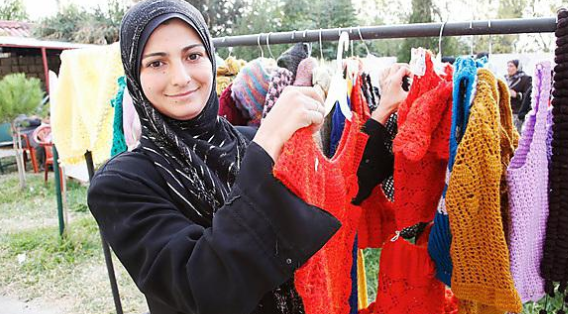
March 29, 2018, by The Ingenuity Lab
Creating Enterprising Futures: The case of women refugees in the Middle East
Despite popular rhetoric that refugees fleeing from conflict regions head towards the Global North, the majority seek shelter in neighbouring developing countries. In the contemporary Middle East conflict for example, Jordan, Lebanon and Turkey have been the major recipients of refugees travelling from Iraq, Syria and Palestine, many of whom are women and children separated from their extended families and support networks. Government initiatives, NGOs and charities support the immediate needs of refugees but also, attempt to assist in supporting them to identify longer term solutions to poverty, exclusion and trauma. Women are particularly susceptible to these issues and in addition, are subject to gender based violence. One critical support strategy has been the encouragement of micro-enterprise. As refugees, formal employment opportunities are very limited – particularly for women – thus home based enterprise – providing local services or producing traditional artisan crafts – has become increasingly important as a form of income generation. In addition, locally based self-employment is safer than informal employment and may also have possible emancipatory effects providing women with some degree of independence and enhanced status. The benefits of such micro-enterprise can also support family cohesion, child support and education plus, wider community benefits. There are also problems with this model where women have to undertake additional responsibilities as income generators whilst still required to provide family care in a context of traditional patriarchy unsympathetic to women as independent actors. In a research project supported by the Economic and Social Research Council and the Department for International Development, we are investigating the impact of micro-enterprise upon refugee women in terms of income generation, enhanced emancipation, family well-being and broader community development.
Within this seminar we will outline the rationale for the project and present preliminary evidence drawn from in-depth meetings with a range of organisations in Jordan, Lebanon and Turkey supporting refugee women and micro entrepreneurship. In addition, we present first-hand interview evidence from a sample of refugee women entrepreneurs in these countries. Our key findings to date suggest that displacement is a long term phenomenon rather than a temporary measure whereby refugees are pushed into creating their own solutions for poverty alleviation.
The majority of refugee women in our study were pushed into micro-entrepreneurship due to their increasing poverty and extreme limitations on formal employment within host countries. They created their opportunities within feminised sectors that capitalised on existing skills such as tailoring, embroidery, hairdressing, cosmetics and catering. Typically, the micro-enterprise owners were targeting customers from their immediate communities, that is, other refugee women; prospects for growth and/or formalisation were minimal. A tiny group of refugee entrepreneur Palestinian and Iraqi women in Jordan managed to break through the barriers formally registering their businesses. This cohort have business premises within affluent neighbourhoods in Amman. Despite such breakthroughs, the changing gender norms amongst the displaced Arab refugee communities are not widely accepted but instead, generate resistance from both men and women within these communities. There are some exceptions amongst Syrian refugee women in Turkey who prefer to remain in ‘liberal Turkey’ rather than return to Syria. These findings have led us to question the extent to which entrepreneurship amongst refugee women is about poverty alleviation rather than wealth creation. Accordingly, during this seminar we will critically evaluate the benefits of supporting refugee enterprise but also, recognise potential problematic issues arising from this strategy.
*Susan Marlow is professor of entrepreneurship at the Haydn Green Institute for Innovation and Entrepreneurship
**Haya Al Dajani is reader in entrepreneurship at the Futures Centre for Entrepreneurship, Plymouth University
***Dr Nasser Yassin is the Director of Research at the Issam Fares Institute, American University of Beirut
The Creating Enterprising Futures: The case of women refugees in the Middle East seminar event will be taking place on 17th May at the Ingenuity Centre. The evening seminar will be followed by drinks and canapes – register your attendance for your free ticket here.
No comments yet, fill out a comment to be the first

Leave a Reply